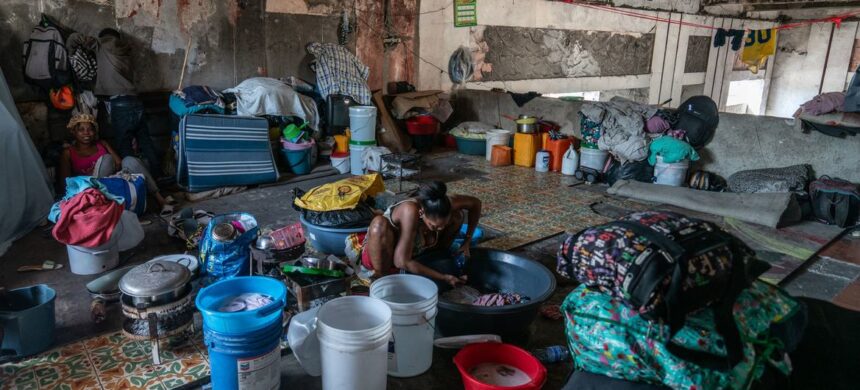The security situation in Haiti has reached a new critical threshold, with more than 20,000 inhabitants forced to leave their homes in Port-au-Prince in less than three days.
The International Organization for Migration (IOM) reports that this mass exodus, one of the most significant since August 2023, is a direct consequence of the intensification of criminal gang activity as gangs tighten their grip on the capital.
Over 17,000 of the displaced have taken refuge in 15 temporary reception sites scattered around the capital. These makeshift facilities are overwhelmed by the influx of families, while distribution networks for essential goods are gradually collapsing.
“The growing isolation of Port-au-Prince is considerably worsening an already catastrophic humanitarian situation,” stressed Grégoire Goodstein, IOM’s Haiti Country Manager. He pointed out that “only 20% of Port-au-Prince remains accessible,” which is seriously hampering the work of humanitarian teams reaching the worst-affected populations.
Gang violence has virtually paralyzed the Haitian capital. Recently, gunfire directed at commercial aircraft has further deteriorated the security situation, including a landmark incident when a Spirit Airlines aircraft was hit while landing at the national airport. A crew member was injured in the incident, illustrating the escalating dangers.
Given the gravity of the situation, the US Federal Aviation Administration (FAA) suspended all flights to Haiti for an initial period of 30 days. This measure further isolated the country, cutting off its main international air link.
With access to the main seaport of Port-au-Prince also restricted by gangs controlling major roads, the delivery of vital resources to vulnerable populations is becoming increasingly complex.
Since the assassination of President Jovenel Moïse in July 2021, Haiti has plunged into an unprecedented spiral of political and security instability. The current wave of displacement is intensifying as armed gangs consolidate their alliances, extending their control over new territories in the capital, systematically isolating communities and reinforcing their domination of Port-au-Prince.
Faced with this rise in power, the Haitian National Police, chronically under-equipped and cruelly understaffed, finds itself unable to contain the expansion of armed groups. Statistics from the United Nations Human Rights Office are alarming, with almost 4,000 victims of gang violence recorded in 2024, testifying to the devastating scale of this security crisis.
Escalating gang violence has particularly exacerbated the vulnerability of women and children. According to IOM data, “94% of displaced women and girls face an increased risk of violence.” Cases of gender-based violence are multiplying dramatically, with the systematic use of sexual violence as an instrument of terror, exposing the extreme vulnerability of displaced populations.
Despite an extremely complex operational context marked by access constraints and pervasive insecurity, IOM and its partners are continuing their vital assistance efforts through:
Mobile clinics: Deployed directly to displacement sites to provide essential medical care.
Rent support: Assistance programs to guarantee accommodation for displaced families.
Protection and psychological support: Increased support for traumatized populations.
Water supply: Regular distribution of drinking water at reception sites.
Support at border crossings: Facilitating safe travel for people fleeing the capital.
“Humanitarian teams face considerable obstacles in reaching affected populations,” insisted Grégoire Goodstein.
Humanitarian efforts in Haiti are severely compromised by a critical funding shortfall. IOM figures reveal an alarming situation: the UN response plan, valued at $674 million, has received only 42% of the necessary funds.
“Without an immediate and substantial international financial commitment, we will witness a catastrophic deterioration in the humanitarian situation,” stressed Mr. Goodstein, urging the international community to step up its support for the Haitian people in distress.
IOM reaffirmed the fundamental importance of respecting humanitarian principles in this unprecedented crisis. The organization strongly appealed to all actors to guarantee the neutrality and impartiality of humanitarian operations, ensuring unrestricted access to vulnerable populations and preserving the integrity of emergency interventions.
Despite these major obstacles, IOM is continuing its operations across the country, running protection centers for migrants and developing community stabilization initiatives, striving to provide vital assistance to increasingly fragile populations, the UN organization said in a report published on Monday.

